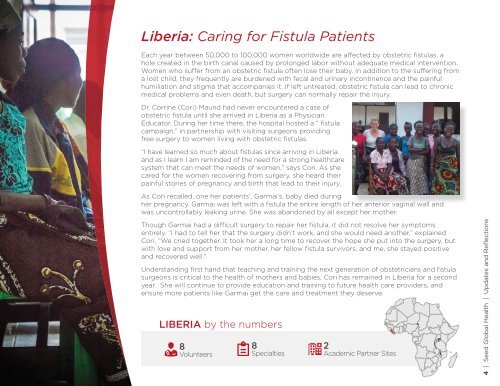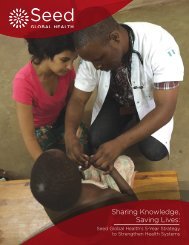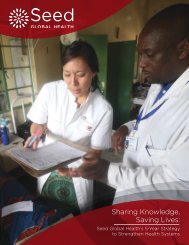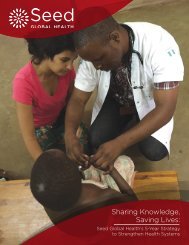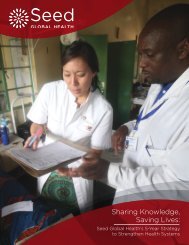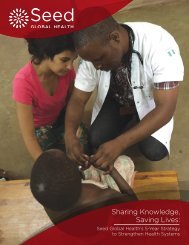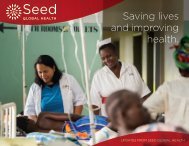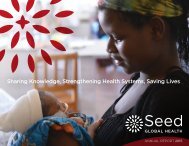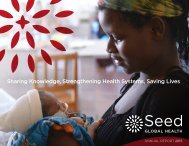Seed Updates and Reflections 2016
You also want an ePaper? Increase the reach of your titles
YUMPU automatically turns print PDFs into web optimized ePapers that Google loves.
Liberia: Caring for Fistula Patients<br />
Each year between 50,000 to 100,000 women worldwide are affected by obstetric fistulas, a<br />
hole created in the birth canal caused by prolonged labor without adequate medical intervention.<br />
Women who suffer from an obstetric fistula often lose their baby. In addition to the suffering from<br />
a lost child, they frequently are burdened with fecal <strong>and</strong> urinary incontinence <strong>and</strong> the painful<br />
humiliation <strong>and</strong> stigma that accompanies it. If left untreated, obstetric fistula can lead to chronic<br />
medical problems <strong>and</strong> even death, but surgery can normally repair the injury.<br />
Dr. Corrine (Cori) Maund had never encountered a case of<br />
obstetric fistula until she arrived in Liberia as a Physician<br />
Educator. During her time there, the hospital hosted a “ fistula<br />
campaign,” in partnership with visiting surgeons providing<br />
free surgery to women living with obstetric fistulas.<br />
“I have learned so much about fistulas since arriving in Liberia<br />
<strong>and</strong> as I learn I am reminded of the need for a strong healthcare<br />
system that can meet the needs of women,” says Cori. As she<br />
cared for the women recovering from surgery, she heard their<br />
painful stories of pregnancy <strong>and</strong> birth that lead to their injury.<br />
As Cori recalled, one her patients’, Garmai’s, baby died during<br />
her pregnancy. Garmai was left with a fistula the entire length of her anterior vaginal wall <strong>and</strong><br />
was uncontrollably leaking urine. She was ab<strong>and</strong>oned by all except her mother.<br />
Though Garmai had a difficult surgery to repair her fistula, it did not resolve her symptoms<br />
entirely. “I had to tell her that the surgery didn’t work, <strong>and</strong> she would need another,” explained<br />
Cori. “We cried together. It took her a long time to recover the hope she put into the surgery, but<br />
with love <strong>and</strong> support from her mother, her fellow fistula survivors, <strong>and</strong> me, she stayed positive<br />
<strong>and</strong> recovered well.”<br />
Underst<strong>and</strong>ing first h<strong>and</strong> that teaching <strong>and</strong> training the next generation of obstetricians <strong>and</strong> fistula<br />
surgeons is critical to the health of mothers <strong>and</strong> babies, Cori has remained in Liberia for a second<br />
year. She will continue to provide education <strong>and</strong> training to future health care providers, <strong>and</strong><br />
ensure more patients like Garmai get the care <strong>and</strong> treatment they deserve.<br />
LIBERIA by the numbers<br />
8<br />
Volunteers<br />
8<br />
Specialties<br />
2<br />
Academic Partner Sites<br />
4 | <strong>Seed</strong> Global Health | <strong>Updates</strong> <strong>and</strong> <strong>Reflections</strong>


